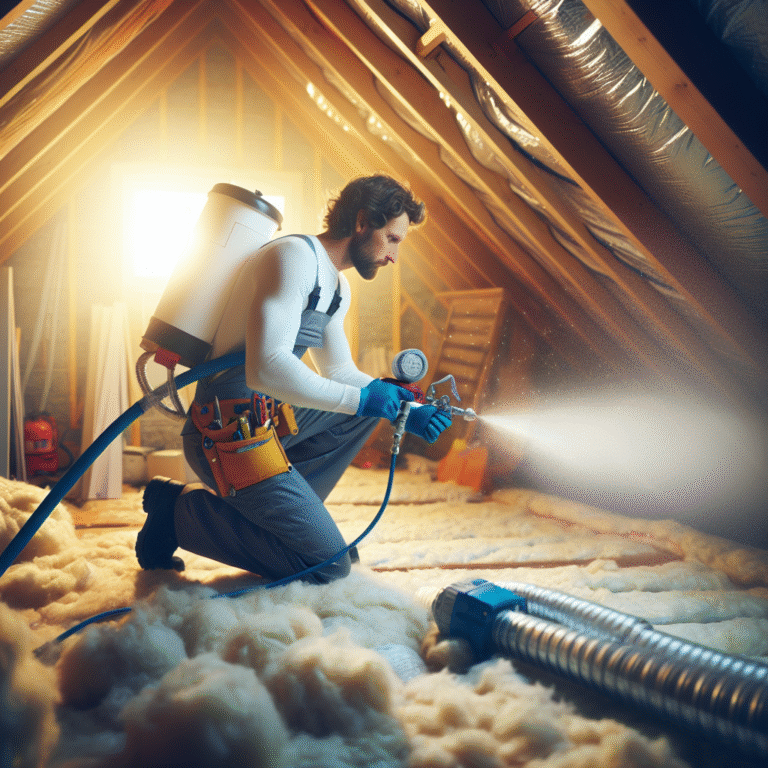-
Table of Contents
“Save money and the planet with proper attic insulation!”
“Save money and reduce your carbon footprint by improving your home’s energy efficiency with proper attic insulation. Visit texasinsulationsolution.com to learn more and schedule a consultation today!”
Introduction
Energy efficiency is a crucial aspect of modern living, as it not only helps reduce our carbon footprint but also saves us money on utility bills. One of the most effective ways to improve energy efficiency in a home is through proper attic insulation. Attic insulation helps to regulate the temperature in a home, keeping it cooler in the summer and warmer in the winter. In this introduction, we will explore the importance of attic insulation and how it can significantly impact energy efficiency in a home.
The Benefits of Attic Insulation for Energy Efficiency
Energy efficiency has become a hot topic in recent years, as people become more aware of the impact their daily actions have on the environment. One area that often gets overlooked when it comes to energy efficiency is the attic. Many homeowners may not realize the significant role that attic insulation plays in reducing energy consumption and increasing energy efficiency in their homes.
Attic insulation is a layer of material that is installed in the attic to prevent heat transfer between the living space and the outside environment. It acts as a barrier, keeping the warm air inside during the winter and the cool air inside during the summer. This simple yet effective solution has numerous benefits, both for the environment and for homeowners’ wallets.
One of the most significant benefits of attic insulation is its ability to reduce energy consumption. According to the U.S. Department of Energy, heating and cooling account for nearly half of the average household’s energy consumption. By properly insulating the attic, homeowners can reduce the amount of energy needed to heat and cool their homes, resulting in lower energy bills. This is especially important during extreme weather conditions, where the heating or cooling system may have to work harder to maintain a comfortable temperature.
In addition to reducing energy consumption, attic insulation also helps to maintain a consistent temperature throughout the home. Without proper insulation, warm air can escape through the attic, causing the heating system to work harder to maintain a comfortable temperature. This can result in uneven temperatures throughout the house, with some rooms feeling too warm while others remain chilly. With attic insulation, the warm air stays inside, creating a more comfortable and consistent temperature throughout the home.
Another benefit of attic insulation is its ability to improve indoor air quality. Attics are often a breeding ground for mold, mildew, and other allergens. Without proper insulation, these pollutants can enter the living space, causing health issues for the occupants. Insulation acts as a barrier, preventing these pollutants from entering the home and improving the overall indoor air quality.
Furthermore, attic insulation can also extend the lifespan of a home’s heating and cooling system. When the system has to work harder to maintain a comfortable temperature, it puts more strain on the equipment, leading to potential breakdowns and costly repairs. By reducing the workload on the system, attic insulation can help prolong its lifespan, saving homeowners money in the long run.
Aside from its practical benefits, attic insulation also has a positive impact on the environment. As mentioned earlier, reducing energy consumption means reducing the amount of fossil fuels burned to generate electricity. This, in turn, reduces the carbon footprint and helps to combat climate change. By making small changes like insulating the attic, homeowners can contribute to a more sustainable future.
In conclusion, attic insulation has numerous benefits for both homeowners and the environment. It reduces energy consumption, maintains a consistent temperature, improves indoor air quality, extends the lifespan of heating and cooling systems, and has a positive impact on the environment. With all these benefits, it’s clear that attic insulation is a simple yet effective solution for increasing energy efficiency in homes. So, if you haven’t already, it’s time to consider insulating your attic and reaping the rewards.
Maximizing Energy Savings with Proper Attic Insulation
Energy efficiency is a hot topic in today’s world, and for good reason. With the increasing cost of energy and the growing concern for the environment, it is important for homeowners to find ways to reduce their energy consumption. One way to do this is by properly insulating your attic. Attic insulation is a crucial component in maximizing energy savings in your home. In this article, we will discuss the importance of attic insulation and how it can help you save money and reduce your carbon footprint.
First and foremost, let’s understand what attic insulation is and how it works. Attic insulation is a material that is installed in the attic space of a home to prevent heat transfer between the living space and the outside environment. In simpler terms, it acts as a barrier to keep the warm air inside during the winter and the cool air inside during the summer. This helps to maintain a comfortable temperature inside your home without relying heavily on heating or cooling systems, thus reducing your energy consumption.
One of the main benefits of attic insulation is its ability to save you money on your energy bills. According to the U.S. Department of Energy, heating and cooling account for nearly half of the average household’s energy consumption. By properly insulating your attic, you can reduce the amount of energy needed to heat or cool your home, resulting in significant savings on your energy bills. In fact, the Department of Energy estimates that homeowners can save up to 20% on their heating and cooling costs by properly insulating their attics.
Aside from saving money, attic insulation also helps to reduce your carbon footprint. As mentioned earlier, heating and cooling systems are responsible for a significant portion of a household’s energy consumption. By reducing the amount of energy needed to heat or cool your home, you are also reducing the amount of greenhouse gas emissions that are released into the environment. This makes attic insulation an environmentally friendly choice for homeowners who are looking to reduce their impact on the planet.
Now that we understand the benefits of attic insulation, let’s discuss how to ensure that it is done properly. The first step is to determine the type of insulation that is best suited for your home. There are various types of insulation available, such as fiberglass, cellulose, and spray foam. Each type has its own advantages and disadvantages, so it is important to consult with a professional to determine the best option for your home.
Once you have chosen the type of insulation, the next step is to ensure that it is installed correctly. Improper installation can lead to gaps and air leaks, which can significantly reduce the effectiveness of the insulation. It is recommended to hire a professional contractor who has experience in installing attic insulation. They will have the necessary tools and expertise to ensure that the insulation is installed properly and effectively.
In addition to proper installation, it is also important to have the right amount of insulation in your attic. The amount of insulation needed depends on various factors such as the climate, the age of your home, and the type of insulation being used. Again, it is best to consult with a professional to determine the appropriate amount of insulation for your home.
In conclusion, attic insulation is a crucial component in maximizing energy savings in your home. It not only helps to save money on energy bills but also reduces your carbon footprint. By choosing the right type of insulation and ensuring proper installation, you can reap the benefits of a well-insulated attic. So, if you want to make your home more energy-efficient, consider investing in attic insulation today.
How Attic Insulation Can Lower Your Energy Bills
Energy efficiency is a hot topic in today’s world, and for good reason. With the increasing cost of energy and the growing concern for the environment, it is important for homeowners to find ways to reduce their energy consumption. One effective way to do this is by properly insulating your attic. Attic insulation not only helps to keep your home warm in the winter and cool in the summer, but it can also significantly lower your energy bills.
The attic is often one of the most overlooked areas of a home when it comes to insulation. Many homeowners assume that their attic is already insulated, or they simply do not realize the impact that proper insulation can have on their energy bills. However, the truth is that a poorly insulated attic can result in a significant amount of energy loss.
So how exactly does attic insulation help to lower your energy bills? The answer lies in the concept of heat transfer. Heat naturally moves from warmer areas to cooler areas, and in the winter, this means that the warm air inside your home will try to escape to the colder outside. Similarly, in the summer, the hot air outside will try to make its way into your cool home. This constant battle between indoor and outdoor temperatures can result in a significant amount of energy loss, and ultimately, higher energy bills.
Attic insulation acts as a barrier to this heat transfer. By properly insulating your attic, you are essentially creating a buffer zone between the inside of your home and the outside. This means that in the winter, the warm air inside your home will be less likely to escape, and in the summer, the hot air outside will be less likely to enter. As a result, your heating and cooling systems will not have to work as hard to maintain a comfortable temperature, leading to lower energy bills.
But how do you know if your attic is properly insulated? One way to check is by looking at your energy bills. If you notice a steady increase in your energy costs, it could be a sign that your attic is not adequately insulated. Another way to check is by physically inspecting your attic. If you can see the floor joists, then you likely do not have enough insulation. Additionally, if your insulation is old or damaged, it may not be as effective in preventing heat transfer.
If you determine that your attic needs more insulation, it is important to choose the right type of insulation for your home. The most common types of attic insulation are fiberglass, cellulose, and spray foam. Fiberglass insulation is the most affordable option, but it can be messy to install and may not be as effective in preventing air leakage. Cellulose insulation is made from recycled materials and is more environmentally friendly, but it can also be messy and may settle over time, reducing its effectiveness. Spray foam insulation is the most expensive option, but it provides the best air sealing and can also help to prevent moisture and mold growth.
In addition to lowering your energy bills, attic insulation can also improve the overall comfort of your home. By reducing the amount of heat transfer, you can eliminate cold drafts in the winter and hot spots in the summer. This can make your home more comfortable and enjoyable for you and your family.
In conclusion, attic insulation is a simple and effective way to lower your energy bills. By creating a barrier to heat transfer, it can help to keep your home warm in the winter and cool in the summer, reducing the workload on your heating and cooling systems. If you suspect that your attic may need more insulation, it is important to take action and choose the right type of insulation for your home. Not only will this save you money on your energy bills, but it will also improve the overall comfort of your home.
Q&A
1. What is attic insulation and how does it improve energy efficiency?
Attic insulation is a material, such as fiberglass or cellulose, that is installed in the attic space of a home to help regulate the temperature inside. It works by creating a barrier between the living space and the outside elements, preventing heat from escaping in the winter and keeping it out in the summer. This helps reduce the amount of energy needed to heat or cool a home, making it more energy efficient.
2. How much can attic insulation save on energy costs?
The amount of energy and money saved by installing attic insulation can vary depending on factors such as the type and amount of insulation, the climate, and the size of the home. However, on average, homeowners can save up to 20% on their heating and cooling costs by properly insulating their attic.
3. Are there any other benefits to having attic insulation besides energy efficiency?
Yes, there are several other benefits to having attic insulation. It can help improve indoor air quality by reducing the amount of outside pollutants and allergens that enter the home. It also helps prevent moisture buildup and potential damage to the roof and walls. Additionally, attic insulation can help reduce noise from outside, making the home more peaceful and comfortable.
Conclusion
In conclusion, attic insulation plays a crucial role in improving energy efficiency in homes. By properly insulating the attic, homeowners can reduce their energy consumption and save money on utility bills. Insulation helps to keep the home cool in the summer and warm in the winter, reducing the need for excessive heating and cooling. It also helps to prevent air leaks and maintain a consistent temperature throughout the home. Overall, investing in attic insulation is a smart choice for both the environment and homeowners’ wallets.




